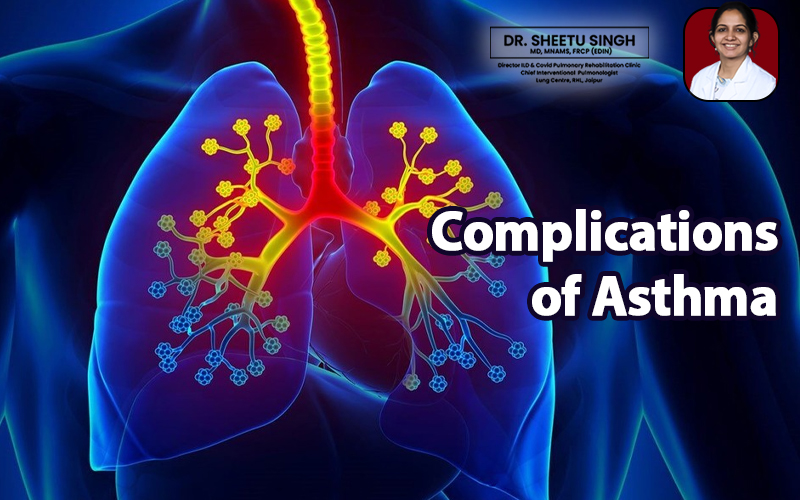
Complications of Asthma: Do you or someone you love suffer from asthma? Have symptoms ever rapidly worsened into frightening breathing struggles? The statistics show that the number of asthma patients is increasing daily.
For most, doctor-prescribed inhalers manage occasional wheezing and shortness of breath flares brought on by triggers like allergies or infection. But for others, asthma complications pose serious risks.
In fact, CDC data reveals almost 450,000 asthma hospitalizations occur annually, along with 1.6 million emergency room visits overall. Clearly, complications represent a real concern. Why do they happen? Which patients face higher risk factors? What constitutes a true emergency needing ER-level care?
Let’s explore key complications to shed light on managing this chronic respiratory disease through all its ups and downs.
Major Asthma Complications
Asthma complications range from mild to life-threatening when asthma symptoms become significantly harder to control. Major categories of complications include:
1. Respiratory Infections
Severe respiratory infection is one of the complicated conditions associated with the asthmatic disease. With airway inflammation and narrowing, viruses and bacteria are welcomed, and you find a strain to grow, taking your health down a notch. These infections can include:
- Pneumonia is an illness that affects the lungs. It results from exposure to microorganisms, such as bacteria, viruses, or fungi. Coughing, fever, and difficulty breathing are symptoms of COVID-19.
- Bronchitis is the swelling and cramping of the airways that open passages for airflow to reach the lungs. Some symptoms are cough due to mucus that gathers in the respiratory system and shortness of breath.
- Sinusitis: The sinuses, the spaces in the bones surrounding the nose, can also be colonized by the same bacteria, imitating a prolonged runny nose. Eclampsia’s signs and symptoms can be characterized by severe facial pain, headache, and nasal discharge.
The risk of developing these infections can be quite severe and especially dangerous for those with asthma. They can trigger asthma attacks that make symptoms manifest even more. To stay out of pneumonia and flu, follow a healthy lifestyle, get vaccinated against these viruses, and obey all your doctor’s instructions.
2. Airway Remodeling
Another side effect of asthma is airway remodeling. This is the progressive and long-lasting process wherein the bronchioles slowly become blocked with scar tissue and thicken over time. Airways can undergo remodeling. This can lead to the emergence of more severe asthma symptoms and may make its control very complicated.
Identifying a precise mechanism for airway remodeling is yet to unlock a mystery, yet it’s believed to be connected with chronic inflammation inside the airways. The problem with the airways always being inflamed is the structural changes that it causes. It ends up with the airways looking narrower and stiffer.
Giving medications aims to prevent airway remodeling, which is bound to happen if the condition is not managed well. The wisest way out is to cooperate closely with your physician with an underlying view to creating a suitable long-term asthma management plan. Such medications may be prescribed, including ones that can be administered in the long term, and prove useful because they have an anti-inflammatory effect on the airways.
3. Asthma Exacerbations
Another issue that poses a threat to asthma patients is its exacerbation, or as asthma attacks are called in common parlance. An asthma attack develops when the airways get severely swollen and tightened, which makes breathing increasingly hard. Symptoms of an asthma attack may include:
- Wheezing
- Chest tightness
- Shortness of breath
- Coughing
- Rapid breathing
To avoid asthma attacks, one must identify and avoid triggers. A trusted caregiver or a trained health professional should perform this health assessment.
4. Mental Health Complications
For an individual with asthma, carrying on a daily life can be overwhelming as well. Asthma is a chronic and unstable disease; it can ruin a patient’s emotional state, making him depressed and obsessed with the thought of having an asthma attack again.
To deal with the mental health problems that may be related to asthma, it’s helpful to discover healthy ways to control stress and anxiety. This could include learning to relax through deep breathing and meditation, being physically active regularly, and having someone close to talk to. You could be the one to seek advice from a professional in mental health if you find it difficult going alone with anxiety.
What Triggers These Complications?
Asthma complications result from various triggers that trigger allergic reactions or irritate respiratory systems. Common triggers leading to flares include:
- Environmental Allergens: Pollen, pet dander, mold, dust mites
- Respiratory Infections: Colds, sinus infections, flu
- Irritants: Cigarette smoke, air pollution, chemicals, fragrances
- Weather Changes: Extreme cold, heat, and humidity increase symptoms
- Exercise: Vigorous workouts may cause airway narrowing
- Stress and Emotions: Anxiety, laughter, yelling can worsen symptoms
- Medications: Some drugs like aspirin and NSAIDs provoke attacks
Risk Factors for Complications
- Certain people face higher odds for asthma complications than others. Risk factors include:
- Uncontrolled Asthma: Poor symptom control despite treatment
- Previous Severe Exacerbations: Past major attacks raise future risk
- Improper Use of Inhalers: Using inhalers incorrectly gets less medicine to lungs
- Low Immunity: Weakened immune systems leave patients vulnerable
- Smoking: Smoking or secondhand smoke exposure exacerbates asthma
- Occupational Hazards: Chemicals, dust, gases in some workplaces make symptoms worse
- Psychological Issues: Stress, anxiety, and depression often intensify asthma
- Genetic Factors: Family history suggests higher inherited risk
Conclusion
The combination of effective management with your physician for treatment and avoiding contact with your personal trigger could mean no complications. But, for high-risk groups, the likelihood of severe response or attack is always higher.
If you are suffering from asthma attacks and can’t allow the symptoms to control your life, remember that help is something you should never hesitate to do. Contact Dr. Sheetu Singh, an asthma specialist with years of experience.
